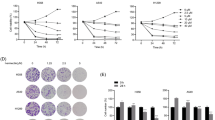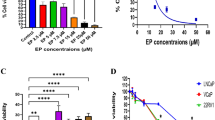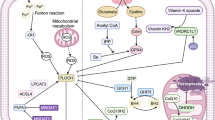Abstract
We previously found that snake venom toxin inhibits nuclear factor kappa B (NF-κB) activity in several cancer cells. NF-κB is implicated in cancer cell growth and chemoresistance. In our present study, we investigated whether snake venom toxin (SVT) inhibits NF-κB, thereby preventing human cervical cancer cell growth (Ca Ski and C33A). SVT (0–12 μg/ml) inhibited the growth of cervical cancer cells by the induction of apoptotic cell death. These inhibitory effects were associated with the inhibition of NF-κB activity. However, SVT dose dependently increased the expression of death receptors (DRs): DR3, DR5 and DR downstream pro-apoptotic proteins. Exploration of NF-κB inhibitor (Phenylarsine oxide, 0.1 μM) synergistically further increased SVT-induced DR3 and DR5 expressions accompanied with further inhibition of cancer cells growth. Moreover, deletion of DR3 and DR5 by small interfering RNA significantly abolished SVT-induced cell growth inhibitory effects, as well as NF-κB inactivation. Using TNF-related apoptosis-inducing ligand resistance cancer cells (A549 and MCF-7), we also found that SVT enhanced the susceptibility of chemoresistance of these cancer cells through down-regulation of NF-κB, but up-regulation of DR3 and DR5. In vivo study also showed that SVT (0.5 and 1 mg/kg) inhibited tumor growth accompanied with inactivation of NF-κB. Thus, our present study indicates that SVT could be applicable as an anticancer agent for cervical cancer, or as an adjuvant agent for chemoresistant cancer cells.










Similar content being viewed by others
References
Aggarwal BB (2004) Nuclear factor-kappaB: the enemy within. Cancer Cell 6(3):203–208. doi:10.1016/j.ccr.2004.09.003
Bagnato A, Cirilli A, Salani D et al (2002) Growth inhibition of cervix carcinoma cells in vivo by endothelin A receptor blockade. Cancer Res 62(22):6381–6384
Ballestrero A, Nencioni A, Boy D et al (2004) Tumor necrosis factor-related apoptosis-inducing ligand cooperates with anticancer drugs to overcome chemoresistance in antiapoptotic Bcl-2 family members expressing jurkat cells. Clin Cancer Res 10(4):1463–1470
Ban JO, Jung YS, Kim DH et al (2014) (E)-2, 4-Bis(p-hydroxyphenyl)-2-butenal inhibits tumor growth via suppression of NF-kappaB and induction of death receptor 6. Apoptosis Int J Program Cell Death 19(1):165–178. doi:10.1007/s10495-013-0903-x
Barkett M, Gilmore TD (1999) Control of apoptosis by Rel/NF-kappaB transcription factors. Oncogene 18(49):6910–6924. doi:10.1038/sj.onc.1203238
Bennacef-Heffar N, Laraba-Djebari F (2003) Evaluation of the effect of gamma rays on the venom of Vipera lebetina by biochemical study. Can J Physiol Pharmacol 81(12):1110–1117. doi:10.1139/y03-112
Bousserouel S, Le Grandois J, Gosse F et al (2013) Methanolic extract of white asparagus shoots activates TRAIL apoptotic death pathway in human cancer cells and inhibits colon carcinogenesis in a preclinical model. Int J Oncol 43(2):394–404. doi:10.3892/ijo.2013.1976
Brown M, Cohen J, Arun P, Chen Z, Van Waes C (2008) NF-kappaB in carcinoma therapy and prevention. Expert Opin Ther Targets 12(9):1109–1122. doi:10.1517/14728222.12.9.1109
Cheah KY, Howarth GS, Bastian SE (2014) Grape seed extract dose-responsively decreases disease severity in a rat model of mucositis; concomitantly enhancing chemotherapeutic effectiveness in colon cancer cells. PloS one 9(1):e85184. doi:10.1371/journal.pone.0085184
de Jong S, Timmer T, Heijenbrok FJ, de Vries EG (2001) Death receptor ligands, in particular TRAIL, to overcome drug resistance. Cancer Metastasis Rev 20(1–2):51–56
Diaz D, Delgadillo DM, Hernandez-Gallegos E et al (2007) Functional expression of voltage-gated sodium channels in primary cultures of human cervical cancer. J Cell Physiol 210(2):469–478. doi:10.1002/jcp.20871
George A, Henkel R (2014) Phytoandrogenic properties of Eurycoma longifolia as natural alternative to testosterone replacement therapy. Andrologia. doi:10.1111/and.12214
Gilmore T, Gapuzan ME, Kalaitzidis D, Starczynowski D (2002) Rel/NF-kappa B/I kappa B signal transduction in the generation and treatment of human cancer. Cancer Lett 181(1):1–9
Grunert M, Gottschalk K, Kapahnke J, Gundisch S, Kieser A, Jeremias I (2012) The adaptor protein FADD and the initiator caspase-8 mediate activation of NF-kappaB by TRAIL. Cell Death Dis 3:e414. doi:10.1038/cddis.2012.154
Jeremias I, Debatin KM (1998) TRAIL induces apoptosis and activation of NFkappaB. Eur Cytokine Netw 9(4):687–688
Kantari C, Walczak H (2011) Caspase-8 and bid: caught in the act between death receptors and mitochondria. Biochim Biophys Acta 1813(4):558–563. doi:10.1016/j.bbamcr.2011.01.026
Kaufmann T, Strasser A, Jost PJ (2012) Fas death receptor signalling: roles of Bid and XIAP. Cell Death Differ 19(1):42–50. doi:10.1038/cdd.2011.121
Kollipara PS, Jeong HS, Han SB, Hong JT (2013) (E)-2, 4-bis(p-hydroxyphenyl)-2-butenal has an antiproliferative effect on NSCLC cells induced by p38 MAPK-mediated suppression of NF-kappaB and up-regulation of TNFRSF10B (DR5). Br J Pharmacol 168(6):1471–1484. doi:10.1111/bph.12024
Kreuz S, Siegmund D, Scheurich P, Wajant H (2001) NF-kappaB inducers upregulate cFLIP, a cycloheximide-sensitive inhibitor of death receptor signaling. Mol Cell Biol 21(12):3964–3973. doi:10.1128/MCB.21.12.3964-3973.2001
Leborgne F, Leborgne JH, Doldan R et al (1997) Induction chemotherapy and radiotherapy of advanced cancer of the cervix: a pilot study and phase III randomized trial. Int J Radiat Oncol Biol Phys 37(2):343–350
Li L, Wang ZX, Wang ZH (2011) Combination of IL-24 and cisplatin inhibits cervical cancer growth in a xenograft nude mice model. Asian Pac J Cancer Prev 12(12):3293–3298
Li J, Ping Z, Ning H (2012) MiR-218 impairs tumor growth and increases chemo-sensitivity to cisplatin in cervical cancer. Int J Mol Sci 13(12):16053–16064. doi:10.3390/ijms131216053
Lin Y, Bai L, Chen W, Xu S (2010) The NF-kappaB activation pathways, emerging molecular targets for cancer prevention and therapy. Expert Opin Ther Targets 14(1):45–55. doi:10.1517/14728220903431069
Lin T, Ding Z, Li N et al (2011) Seleno-cyclodextrin sensitises human breast cancer cells to TRAIL-induced apoptosis through DR5 induction and NF-kappaB suppression. Eur J Cancer 47(12):1890–1907. doi:10.1016/j.ejca.2011.04.004
Liu Y, Xie S, Wang Y, Luo K, Cai Y (2012) Liquiritigenin inhibits tumor growth and vascularization in a mouse model of HeLa cells. Molecules 17(6):7206–7216. doi:10.3390/molecules17067206
Lu J, Qin Q, Zhan LL et al (2014) Association of four polymorphisms in the death receptor 4 gene with cancer risk: an updated meta-analysis. Tumour Biol. doi:10.1007/s13277-014-1667-9
Luque I, Gelinas C (1997) Rel/NF-kappa B and I kappa B factors in oncogenesis. Semin Cancer Biol 8(2):103–111. doi:10.1006/scbi.1997.0061
Mahmood Z, Shukla Y (2010) Death receptors: targets for cancer therapy. Exp Cell Res 316(6):887–899. doi:10.1016/j.yexcr.2009.12.011
Murtaza I, Adhami VM, Hafeez BB, Saleem M, Mukhtar H (2009) Fisetin, a natural flavonoid, targets chemoresistant human pancreatic cancer AsPC-1 cells through DR3-mediated inhibition of NF-kappaB. Int J Cancer 125(10):2465–2473. doi:10.1002/ijc.24628
Nakanishi C, Toi M (2005) Nuclear factor-kappaB inhibitors as sensitizers to anticancer drugs. Nat Rev Cancer 5(4):297–309. doi:10.1038/nrc1588
Naugler WE, Karin M (2008) NF-kappaB and cancer-identifying targets and mechanisms. Curr Opin Genet Dev 18(1):19–26. doi:10.1016/j.gde.2008.01.020
Nguyen HN, Nordqvist SR (1999) Chemotherapy of advanced and recurrent cervical carcinoma. Semin Surg Oncol 16(3):247–250
Parajuli B, Lee HG, Kwon SH et al (2013a) Salinomycin inhibits Akt/NF-kappaB and induces apoptosis in cisplatin resistant ovarian cancer cells. Cancer Epidemiol 37(4):512–517. doi:10.1016/j.canep.2013.02.008
Parajuli B, Shin SJ, Kwon SH et al (2013b) Salinomycin induces apoptosis via death receptor-5 up-regulation in cisplatin-resistant ovarian cancer cells. Anticancer Res 33(4):1457–1462
Park MH, Song HS, Kim KH et al (2005) Cobrotoxin inhibits NF-kappa B activation and target gene expression through reaction with NF-kappa B signal molecules. Biochemistry 44(23):8326–8336. doi:10.1021/bi050156h
Park HH, Lo YC, Lin SC, Wang L, Yang JK, Wu H (2007) The death domain superfamily in intracellular signaling of apoptosis and inflammation. Annu Rev Immunol 25:561–586. doi:10.1146/annurev.immunol.25.022106.141656
Park MH, Son DJ, Kwak DH et al (2009) Snake venom toxin inhibits cell growth through induction of apoptosis in neuroblastoma cells. Arch Pharmacal Res 32(11):1545–1554. doi:10.1007/s12272-009-2106-0
Park MH, Jo M, Won D et al (2012a) Snake venom toxin from Vipera lebetina turanica induces apoptosis of colon cancer cells via upregulation of ROS- and JNK-mediated death receptor expression. BMC Cancer 12:228. doi:10.1186/1471-2407-12-228
Park MH, Jo M, Won D, Song HS, Song MJ, Hong JT (2012b) Snake venom toxin from Vipera lebetina turanica sensitizes cancer cells to TRAIL through ROS- and JNK-mediated upregulation of death receptors and downregulation of survival proteins. Apoptosis Int J Program Cell Death 17(12):1316–1326. doi:10.1007/s10495-012-0759-5
Pecorelli S (2009) Revised FIGO staging for carcinoma of the vulva, cervix, and endometrium. Int J Gynaecol Obstet 105(2):103–104
Ratajczak MZ, Jadczyk T, Schneider G, Kakar SS, Kucia M (2013) Induction of a tumor-metastasis-receptive microenvironment as an unwanted and underestimated side effect of treatment by chemotherapy or radiotherapy. J Ovarian Res 6(1):95. doi:10.1186/1757-2215-6-95
Rayet B, Gelinas C (1999) Aberrant rel/nfkb genes and activity in human cancer. Oncogene 18(49):6938–6947. doi:10.1038/sj.onc.1203221
Sami S, Hoti N, Xu HM, Shen Z, Huang X (2008) Valproic acid inhibits the growth of cervical cancer both in vitro and in vivo. J Biochem 144(3):357–362. doi:10.1093/jb/mvn074
Sarkar FH, Li Y (2008) NF-kappaB: a potential target for cancer chemoprevention and therapy. Front Biosci 13:2950–2959
Schneider P, Thome M, Burns K et al (1997) TRAIL receptors 1 (DR4) and 2 (DR5) signal FADD-dependent apoptosis and activate NF-kappaB. Immunity 7(6):831–836
Shankar S, Ganapathy S, Chen Q, Srivastava RK (2008) Curcumin sensitizes TRAIL-resistant xenografts: molecular mechanisms of apoptosis, metastasis and angiogenesis. Mol Cancer 7:16. doi:10.1186/1476-4598-7-16
Shetty S, Gladden JB, Henson ES et al (2002) Tumor necrosis factor-related apoptosis inducing ligand (TRAIL) up-regulates death receptor 5 (DR5) mediated by NFkappaB activation in epithelial derived cell lines. Apoptosis Int J Program Cell Death 7(5):413–420
Son DJ, Park MH, Chae SJ et al (2007) Inhibitory effect of snake venom toxin from Vipera lebetina turanica on hormone-refractory human prostate cancer cell growth: induction of apoptosis through inactivation of nuclear factor kappaB. Mol Cancer Ther 6(2):675–683. doi:10.1158/1535-7163.MCT-06-0328
Song JK, Jo MR, Park MH et al (2012) Cell growth inhibition and induction of apoptosis by snake venom toxin in ovarian cancer cell via inactivation of nuclear factor kappaB and signal transducer and activator of transcription 3. Arch Pharmacal Res 35(5):867–876. doi:10.1007/s12272-012-0512-1
Szliszka E, Jaworska D, Ksek M, Czuba ZP, Krol W (2012) Targeting death receptor TRAIL-R2 by Chalcones for TRAIL-induced apoptosis in cancer cells. Int J Mol Sci 13(11):15343–15359. doi:10.3390/ijms131115343
Szliszka E, Sokol-Letowska A, Kucharska AZ, Jaworska D, Czuba ZP, Krol W (2013) Ethanolic extract of polish propolis: chemical composition and TRAIL-R2 death receptor targeting apoptotic activity against prostate cancer cells. Evid Based Complement Alternat Med 2013:757628. doi:10.1155/2013/757628
Tanaka T, Yukawa K, Umesaki N (2006) Effective chemoradiotherapy protocol with 5-fluorouracil for cervical squamous cell carcinoma in vitro. Eur J Gynaecol Oncol 27(3):243–246
Ungerback J, Belenki D, Jawad ul-Hassan A et al (2012) Genetic variation and alterations of genes involved in NFkappaB/TNFAIP3- and NLRP3-inflammasome signaling affect susceptibility and outcome of colorectal cancer. Carcinogenesis 33(11):2126–2134. doi:10.1093/carcin/bgs256
Wajant H (2004) TRAIL and NFkappaB signaling—a complex relationship. Vitam Horm 67:101–132. doi:10.1016/S0083-6729(04)67007-5
Wiezorek J, Holland P, Graves J (2010) Death receptor agonists as a targeted therapy for cancer. Clin Cancer Res 16(6):1701–1708. doi:10.1158/1078-0432.CCR-09-1692
Yin XM (2000) Signal transduction mediated by Bid, a pro-death Bcl-2 family proteins, connects the death receptor and mitochondria apoptosis pathways. Cell Res 10(3):161–167. doi:10.1038/sj.cr.7290045
Yu J, Ma Y, Drisko J, Chen Q (2013) Antitumor activities of Rauwolfia vomitoria extract and potentiation of carboplatin effects against ovarian cancer. Curr Ther Res Clin Exp 75:8–14. doi:10.1016/j.curtheres.2013.04.001
Zanetta G, Fei F, Mangioni C (2000) Chemotherapy with paclitaxel, ifosfamide, and cisplatin for the treatment of squamous cell cervical cancer: the experience of Monza. Semin Oncol 27(1 Suppl 1):23–27
Acknowledgments
This work was supported by the National Research Foundation of Korea (NRF) Grant by the Korea government (MEST; MRC, 2008-0062275). The authors also wish to also acknowledge the financial support of the Catholic Medical Center Research Foundation made in the program year of 2012.
Conflict of interest
The authors declare that there is no conflict of interest.
Author information
Authors and Affiliations
Corresponding authors
Additional information
Hye Lim Lee and Mi Hee Park have contributed equally.
Rights and permissions
About this article
Cite this article
Lee, H.L., Park, M.H., Hong, J.E. et al. Inhibitory effect of snake venom toxin on NF-κB activity prevents human cervical cancer cell growth via increase of death receptor 3 and 5 expression. Arch Toxicol 90, 463–477 (2016). https://doi.org/10.1007/s00204-014-1393-5
Received:
Accepted:
Published:
Issue Date:
DOI: https://doi.org/10.1007/s00204-014-1393-5




